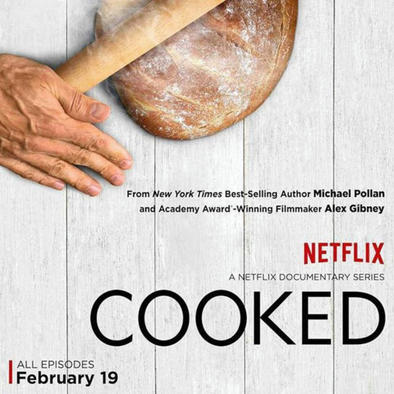Michael and I recently watched a documentary series on Netflix called “Cooked.” It was done by Michael Pollan, of “In Defense of Food” and “The Omnivore’s Dilemma” fame.
While I wasn’t a huge fan of his books (granted, I read them a long time ago and maybe if I re-read them now I’d feel differently?), I really enjoyed the documentary series. I found him more compelling and interesting in the TV show than on paper. Go figure.

It’s in four parts, each have a theme and tell the history of cooking and discuss issues that face humans for the future of food. A common threat — processed foods and the growing number of people with Type 2 Diabetes.
“Humans have been cooking since prehistoric times. But cuisine only developed when pots and pans were created that could stand up to the heat of fire. That made it possible to combine ingredients, creating flavor combinations that were unique to specific places.”
I really liked that each part of the series took place in a different part of the world and gave insight into the different cultures and histories of food there.
Fire – This episode began in Australia with aboriginal people who go into the bush to reclaim their old tribal ways with hunting and cooking in the wild– with fire, obviously. It also told the story of a Pitmaster in the American south who learned how to BBQ as a child.
Be forewarned — there were a few scenes that might contain animal slaughter (humane). I left the room at those moments because I have a hard time watching that stuff.
“They discuss the cultural history of the Aboriginal people, how they left their cultural lands thereby changing their diet. At the time when they left their native lands, changing to the western diet, they developed all the metabolic diseases common in our culture. When they went back to their cultural eating styles, removing fast foods and sugar from their diets, their health markers dramatically improved within six weeks.” (source)
That was really shocking to me (and I wanted to hear more about that but the episode didn’t spend too much time on that).
Water – This episode took place in India and Mumbai. It was interesting to see how the processed food market of the US was invading India and so many people there were eating junk food and fast food and soda, instead of the traditional foods that they used to COOK themselves.
This episode also talked about the birth of processed foods/fast foods in America–the TV Dinner! Spam! Everything processed! It was interesting, and frightening, to see the history and the old footage of commercials from the 50’s.
“The average American currently spends just 27 minutes a day on food preparation. That’s half the amount of time that was spent cooking in 1965.”
Processed foods were actually developed during war time to feed the troops, and then that carried over to the American diet.
It’s still true today–the worse the food, the cheaper it is. Which is tragic and that needs to change.
Air – This episode was about bread. Watching the baker make sourdough bread really inspired both Michael and I to want to try and make our own.

He discussed how commercial bread was changed from bread the way it used to be made. Commercial bread has something like 37 ingredients in it when homemade bread is really only a few ingredients! The episode talked about the gluten-free fad, celiacs diseased, and the history of bread. They showed old commercials of Wonderbread. (The commercials were so creepy!)
Earth – This episode was all about fermentation–beer, chocolate, kimchi, kombucha. They went to Peru and showed the cacao fruits that are hacked in two, then the cacao beans (which are engulfed in this white slime) are scooped out to ferment. Crazy!

Historically, people fermented food in the fall to keep all winter long. In this episode they talked to a nun who is also a microbiologist who makes her own cheese in the nunnery! She was super fascinating and I wanted to know more about her, honestly.

The documentary series was really good and we both enjoyed it. I will say that each episode left me feeling like there needed to be a little bit more. Like in Fire they only briefly discussed the effect of “modern” (American) food on Aboriginal people and it felt very brushed over and I just wanted them to spend more time on it. If that meant each episode was 90 minutes long instead of an hour, so be it, but I think that could have helped the series.
Have you seen this series? What were your thoughts?




Ingunn
I really liked that show! My husband got totally into sourdough for a while after we watched it. (I’m a big fan of his books!) He also had a great special on PBS last year called In Defense of Food that I definitely recommend.
Lisa Eirene
That’s cool that he made sourdough! I really want to try it. We need to make a sourdough starter and I just haven’t looked for a recipe yet. Someday when we have free time (LOL).
Thanks! I will look for that other documentary.